In this series for PA Future, as we enter spring, we ask senior members of the responsible investment industry about what the next iteration of ESG looks like, to share their fresh additions to portfolios and what they would like to see emerge from regulators.
Ashley Hamilton Claxton, head of responsible investment at Royal London Asset Management, discusses how ESG is maturing and growing more complex, exploring new product ideas to meet client demand for climate-conscious investments, and how regulators need to help the market digest the myriad new disclosure requirements.
The first quarter of 2024 has seen industry spokespeople talk about the next iteration of ESG or how ‘ESG is growing up’. What’s your take on this? What is key for the next evolution in this space?
A few years ago I used to talk about the industry being in its teenage years. Newcomers to the industry and new fund launches really started testing some of the boundaries, creating more innovation but also raising risks of greenwashing. Now I’d say we are in the ‘young adult’ phase. The industry is more comfortable asserting itself, but at the same time it is still figuring out the rules of the game. We are in a maturing phase, putting in more rigorous risks and controls. I think we also now realise that things aren’t black and white, there is complexity to ESG and sustainability issues, which means a lot more shades of grey and, in many situations, no one right answer.
Which new themes are you exploring in portfolios?
We are looking in a lot more detail at climate awareness, climate transition and net zero options in funds. In particular, how can we meet the demand from clients for net-zero products, but also meet their risk and return requirements. We are still exploring whether this change can be implemented within existing products, or if we need to change products, or create new ones, to meet our client needs. Second, we are receiving a lot more questions on biodiversity, so we are trying to practically apply some biodiversity tools and metrics at fund level to see if we can identify any trends or risks, and opportunities for engagement. Finally, human rights was a growing theme when we reached out to our clients last year – they are interested in things like modern slavery and supply chain concerns.
It has been said many times that the industry is just at the beginning of ESG regulation. What else would you like to see?
I would like to see more guidance and case studies from regulators and industry associations to help us practically apply some of the regulations. The devil is always in the detail and it’s not until we start to apply it that the challenges and questions come out. I would also caution regulators to be mindful of the quantum and complication of recent regulatory change. There is a risk that we are trying to do too much at once, which can lead to poor outcomes for customers. For example, by increasing costs and volume of disclosures which just add to the communication challenge and leave customers none the wiser.
Spring is a time for new beginnings. What are you looking at with a fresh perspective in your personal or work life and why?
My biggest lesson for both my personal and professional life is ‘slow down’. I recently injured myself in a skiing accident. Being physically restrained in a brace and crutches, plus the initial prospect of surgery and a six-month recovery (not required, thankfully!), sent the message loud and clear. I, like far too many of my colleagues in this industry, have been on hyper-drive for the last few years. Trying to do the right thing for our clients and feeling personally responsible for trying to make the world a better place. It’s utterly exhausting. So many of us are burning out, with some even leaving the industry. So, my message to myself and my colleagues is slow down. Walk forward with intent. And practice self-care so that we have the physical and mental energy to keep going for the long term.








